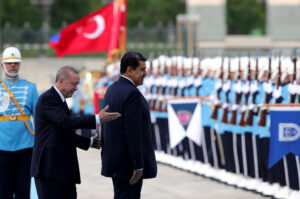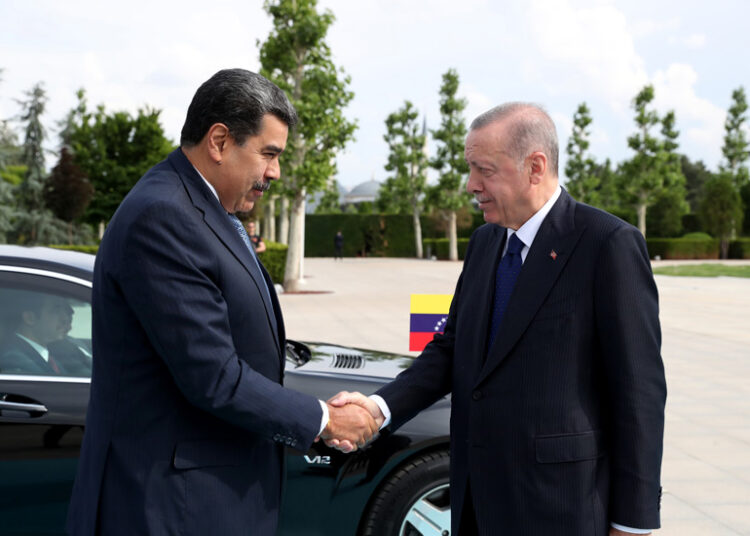Abdullah Bozkurt/Stockholm
The Turkish government has aligned itself with Venezuela in defending against accusations of human rights violations in the Latin American country after the United Nations said Venezuela’s actions have been characterized by repressive and heavy-handed tactics, at times reaching the level of crimes against humanity, all aimed at suppressing the will of its people.
In recent years the government of Turkish President Recep Tayyip Erdogan has nurtured close relations with the Venezuelan government under the leadership of President Nicolás Maduro. This warm rapport was evident when Turkey issued a statement in support of the repressive regime in Latin America during the UN Human Rights Council meeting held on September 25 in Geneva.
The council discussed a report prepared by a UN independent fact-finding mission, which ultimately concluded that Venezuelan authorities had orchestrated and executed a policy designed to suppress, deter and eliminate opposition to the government, even resorting to actions that could be classified as crimes against humanity.
Turkey voiced objections to the findings of the report, contending that the UN had not adequately considered the perspective of the Venezuelan government. Furthermore, Turkey attempted to offer a justification for the grave human rights violations in Venezuela by asserting that the report failed to acknowledge improvements in security and socio-economic conditions within the country.
In what appeared to be a criticism directed at the United States and its allies who had imposed punitive measures on the Maduro government due to rights violations, Turkish Ambassador Güven Begeç, who serves as the permanent representative of Turkey to the UN Office in Geneva, remarked that the “unilateral course of measures have a negative impact on the daily life of all Venezuelans, a fact that is not incorporated into the report, either.”
He added that “the challenges including those in the field of human rights can be only solved through dialogue and cooperation among the Venezuelans themselves.” In other words, Turkey views the situation as an internal matter for Venezuela and may be implying that external entities, including the UN, should refrain from any interference or intervention.
Turkish Ambassador Güven Begeç’s remarks at the UN Human Rights Council:
According to the UN report, the Venezuelan government has persisted in practices such as arbitrary detentions, enforced disappearances, torture and other forms of cruel, inhuman or degrading treatment. Additionally, it highlighted incidents of sexual and gender-based violence against individuals who opposed the government. The report categorized these actions as crimes against humanity, indicating their gravity and systematic nature.
The Maduro government has deployed both the hardline and softer tactics of repression against real or perceived opponents, the UN investigators concluded.
“These are two components of an oppressive State apparatus that has been used at varying degrees, depending on the nature and perceived influence of social dissent. On the one hand, during the earlier period of massive popular protests on the Venezuelan streets between 2014 and 2019, the more violent ‘hardline’ tactics were actively used to silence opposition voices at any cost, including through the commission of crimes. On the other hand, the State’s use of ‘softer’ coercive tactics, although present previously, has become more recurrent in recent years,” the report said.
The UN believes that the Maduro government’s shift toward softer tactics of repression may have been influenced by several factors. Firstly, the authorities had already established a “chilling effect” through their prior efforts to suppress dissent, which had a deterrent impact on potential opposition.
Secondly, international scrutiny and condemnation of past violations could have played a role. The global community’s attention to and criticism of the government’s actions may have led to a recalibration of tactics, with a preference for methods that are less likely to draw as much international condemnation.
Lastly, the significant number of people leaving the country out of well-founded fears of political persecution may have prompted the government to adapt its tactics. With many individuals fleeing the country, there may have been a need to use tactics that are more subtle but still effective in maintaining control over the population.
“However, the use of ‘softer’ mechanisms of repression is backed by the latent threat that the State can at any time resort to more ‘hardline’ tactics, which the Government can activate or deactivate at will,” the UN underlined. It added that “it is imperative that real and effective justice and accountability continue to be the yardstick by which the Venezuelan human rights situation is measured, and that the international community continues to oversee this situation.”

Indeed, both the governments of Maduro in Venezuela and Erdogan in Turkey have faced serious criticism and credible allegations of human rights violations on a significant scale. There have been instances where these regimes have been found to be in violation of UN human rights conventions, and UN experts have issued reports that underscore systematic human rights abuses in both countries.
These allegations and reports have sparked international concern and scrutiny, highlighting the importance of upholding human rights standards and the need for accountability for human rights violations in Turkey and Venezuela.
Both President Erdogan and President Maduro have been accused of authoritarian governance with extensive power that lacks effective checks and balances. They have faced allegations of repressing critics, opponents and dissidents through various means, including torture, enforced disappearances, and the manipulation of law enforcement and the criminal justice system to silence and imprison their opponents.
Furthermore, the issue of impunity is a significant concern in both countries. Those accused of human rights violations in Turkey and Venezuela often do not face accountability or legal consequences for their actions. This lack of accountability raises important questions about the rule of law and the protection of human rights in both nations, and it remains a topic of international concern and advocacy for human rights organizations.
The shared factor of a troubling human rights record is not the sole similarity between the two presidents. Maduro and Erdogan also exhibit a pronounced degree of anti-Western sentiment in both their policy actions and rhetoric. This sentiment becomes particularly obvious when addressing domestic issues and attempting to deflect blame from their governments’ actions. On numerous occasions, they have resorted to anti-Western narratives to shift responsibility for their governments’ wrongdoing onto external actors, with a notable focus on the US.

Indeed, Maduro and Erdogan’s regular bilateral visits, the multitude of agreements they’ve forged and their public declarations of solidarity underscore their dedication to align and collaborate on numerous fronts. These diplomatic ties and displays of support carry considerable importance for their individual foreign policies and international relations, ultimately strengthening their positions not only at the regional but also on the global stage.
Erdogan is anticipated to make a second visit to Caracas, following his historic 2018 visit, which marked the first-ever visit by a Turkish head of state to Venezuela. Preparations for this upcoming visit were announced during a joint press conference held in Ankara on July 21, where Venezuelan Foreign Minister Yvan Gil and his Turkish counterpart shared the news.
Fidan also said he and his Venezuelan counterpart had discussed cooperation in the defense industry, among other areas of mutual interest, from energy to tourism. The Turkish minister criticized the US, though not mentioning it by name, and affirmed his government’s opposition to unilateral sanctions and external interventions in Venezuela.
Full text of report of the UN independent international fact-finding mission on Venezuela:
In contrast, his Venezuelan counterpart openly mentioned the United States in his remarks, stating that his country is confronted with approximately 900 distinct sanction measures imposed by Washington. He emphasized Turkey’s strong support in opposing these sanctions and expressed a commitment to enhancing their cooperation in countering them. He characterized Venezuela as Turkey’s most significant partner from a strategic and geopolitical standpoint, highlighting the importance of their bilateral relationship.
Indeed, the Erdogan government has been providing support to the Maduro regime in Venezuela to mitigate the impact of sanctions. This support has taken various forms, including commercial, financial and other incentives aimed at helping Venezuela navigate the challenges posed by multiple measures.
One noteworthy example of this involvement is the transportation of Venezuelan gold to Turkey for refining and certification since 2018. There have been allegations that a portion of this gold ultimately found its way to Iran. In October 2018 Marshall Billingslea, the assistant secretary for terrorist financing at the US Treasury at the time, accused the Turkish government of evading international sanctions by purchasing substantial amounts of Venezuelan gold in the preceding months. This issue has attracted international attention and raised concerns about Turkey’s role in assisting the Maduro regime in circumventing sanctions.












